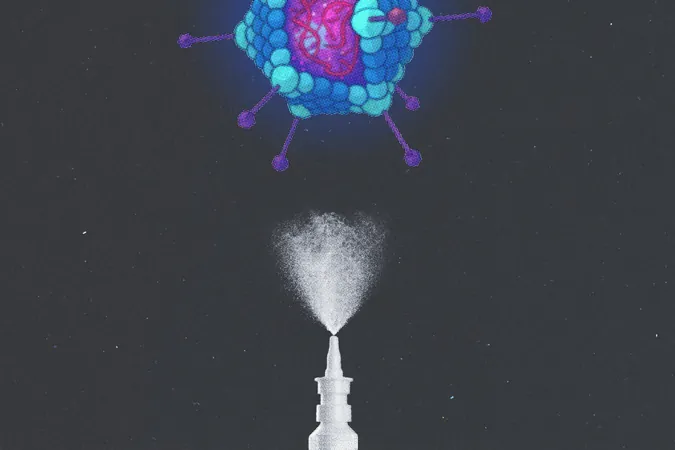
The Future of Vaccines: Quick, Easy, and Innovative
2025-09-17
Author: Liam
Revolutionizing Vaccine Development
As the world grappled with the COVID-19 pandemic, it became painfully clear that our healthcare systems were ill-equipped to handle such a crisis. Hospitals were overwhelmed, and countries found themselves scrambling for vaccine supplies. Canada, in particular, faced significant delays in vaccine availability, highlighting the urgent need for a more robust approach to vaccine production.
Now, scientists are reimagining the landscape of vaccine development—focusing on speed, efficiency, and adaptability. We spoke with Professor Peter Pelka from the University of Manitoba’s microbiology department to uncover what the future holds for vaccines.
Accelerated Manufacturing: Vaccines in Just 100 Days!
Traditionally, vaccine development has taken years, a timeline that is simply too slow in the face of rapidly spreading viruses. The COVID-19 pandemic demonstrated that rapid vaccine creation is possible, yet Canada’s inability to produce its own vaccines left many citizens vulnerable.
Pelka and his team are on a mission to revolutionize this process. They are developing a platform that could produce vaccines against emerging viral threats in as little as 100 days. "Imagine a world where, regardless of the pathogen, we can have a vaccine ready to deploy in just over three months," Pelka explains.
Investing in Local Infrastructure
Thanks to a substantial $57 million federal investment, the University of Manitoba is establishing the Prairie Biologics Accelerator and the PRAIRIE One Health Emerging Respiratory Disease Centre. These state-of-the-art facilities will collaborate with universities across Western Canada, forming a biomanufacturing hub that enhances the capacity to create vaccines domestically.
Pelka notes, "COVID-19 showed us that not having local manufacturing was a critical flaw. We cannot let that happen again. Our goal is to prioritize and protect our citizens by producing vaccines right here at home."
Needle-Free Vaccination: A Game Changer
The traditional syringe is about to become a relic of the past. Pelka believes the future of vaccines lies in more accessible forms of delivery, including oral doses and nasal sprays. As he points out, methods like these are not new—consider the polio vaccine—but have the potential to transform the vaccination experience.
Needle-free solutions could eliminate barriers to access, making it easier for communities without healthcare professionals to receive crucial immunizations. Moreover, these vaccines could be stored without special equipment, allowing for more widespread distribution.
Harnessing AI for Smarter Vaccine Development
Another groundbreaking aspect of future vaccine development is the integration of artificial intelligence. Pelka and his team are leveraging AI to analyze vast amounts of data generated from animal studies. By identifying which immune responses are pivotal for vaccine efficacy, they can streamline the testing process and focus resources more effectively.
This shift from trial-and-error to targeted design will significantly accelerate vaccine development, moving closer to the ambitious goal of a 100-day turnaround.
Economic and Innovative Benefits for Manitoba
The establishment of the Prairie Biologics Accelerator and PRAIRIE Centre promises to bring more than just health security. The construction phase will generate numerous jobs, while the long-term impact will cultivate a thriving research and biomanufacturing sector.
Once operational, these cutting-edge facilities will attract top talent to Manitoba, fostering innovation in vaccine research and creating pathways for the next generation of healthcare leaders.
Join the Revolution in Vaccine Research
As we explore the transformative work being done by researchers like Peter Pelka, it's clear that the future of vaccines is bright. With a focus on quick, safe, and innovative solutions, Manitoba is positioning itself at the forefront of global vaccine development, ensuring we are better equipped for whatever challenges lie ahead.









 Brasil (PT)
Brasil (PT)
 Canada (EN)
Canada (EN)
 Chile (ES)
Chile (ES)
 Česko (CS)
Česko (CS)
 대한민국 (KO)
대한민국 (KO)
 España (ES)
España (ES)
 France (FR)
France (FR)
 Hong Kong (EN)
Hong Kong (EN)
 Italia (IT)
Italia (IT)
 日本 (JA)
日本 (JA)
 Magyarország (HU)
Magyarország (HU)
 Norge (NO)
Norge (NO)
 Polska (PL)
Polska (PL)
 Schweiz (DE)
Schweiz (DE)
 Singapore (EN)
Singapore (EN)
 Sverige (SV)
Sverige (SV)
 Suomi (FI)
Suomi (FI)
 Türkiye (TR)
Türkiye (TR)
 الإمارات العربية المتحدة (AR)
الإمارات العربية المتحدة (AR)